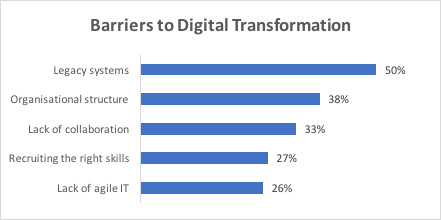COBOL & The Definitive State of the World’s Greatest Legacy Ecosystem
June 28th, 2017
TL;DR — see picture left, or… a career COBOL’er makes a compelling argument that legacy application systems (COBOL et al) on the IBM Mainframe are killing IT digital transformation initiatives.
So, a heads-up… this article is going to be self-serving (at least to start with, perhaps longer), as I’ve come to the conclusion that it is necessary for me to “introduce” myself in an attempt to establish a greater level of credibility than I might otherwise be able to muster!
I’ve been working for over 30 years. My entire career has been in the “COBOL space”, the vast majority of it working with Global 2000 companies to deliver COBOL application development & deployment platforms that were primarily focused on adding value to the IBM Mainframe (“The World’s Greatest Legacy Ecosystem”).
I have worked at the “coal face” developing bespoke commercial COBOL applications. I have worked developing COBOL compilers and runtimes. I have led global teams of astoundingly brilliant people that have built COBOL ecosystems from scratch. Back in 2010, myself and a group of others with similar career profiles, and significantly greater areas of expertise, founded Heirloom Computing to bring a new COBOL ecosystem to market.
Heirloom leverages open-source software stacks (primarily Java); one that immediately exposes existing business rules from mainframe workloads as a collection of Java interfaces and RESTful services so they are immediately available to other applications; one that from day 1 is absolutely guaranteed to accurately retain existing business logic, data integrity, and security profiles; one that allows application developers (using Eclipse) to continue in COBOL, or Java, or both, so IT can “iterate away” from a constrained model to an agile one, at a pace that is determined by their own unique business drivers. This approach removes the “re-platforming” risk and makes the workload instantly agile.
We did this because we believe (and our investors and customers have validated) that IT needs to get beyond decades-old legacy systems if they are going to compete in a digital world.
Credibility enhanced? Either way, on we go…
The IBM Mainframe is without a doubt (and by far) “The World’s Greatest Legacy Ecosystem”. Its reliability, pervasiveness, and keeper of systems of record are unmatched. Today, however, that proud legacy is increasingly burdensome. These (crucial) systems: are severely & systemically constrained (and today, agility really matters); have paralyzed IT with a (fearful non-viable) “do nothing” strategy which consequently inhibits execution of strategic initiatives (like digital transformation) that are needed to compete. And up to this point, we’ve not even mentioned the operational expense nor the risks of an ever-aging/depleting skills pool.
Some of these systems, especially in government, have eroded/warped to the point that paper processes have been introduced to integrate legacy workloads with new services! This is NOT a failure of DevOps, nor tooling, but a failure of leadership and the brutal reality that mainframe systems of record are inherently NOT agile because a) they were never designed that way, and b) the COBOL ecosystem itself (an archaic compute-model, a procedural language, a failure to embrace open source, a lack of application frameworks, an entrenched culture, …) is NOT agile.

In article, after article, after article, IT leaders and analysts have clearly identified the challenge. Progressive enterprises like GE and Capital One are already working on solutions. Mainframe workloads are an essential part of any digital transformation strategy, but those workloads will persist in a different form. One that protects existing function, but also one that is seamlessly integrated with an agile ecosystem.
